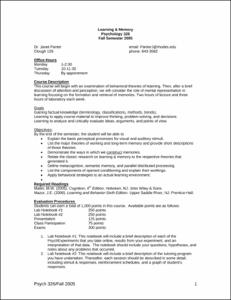Please use this identifier to cite or link to this item:
http://hdl.handle.net/10267/1030Full metadata record
| DC Field | Value | Language |
|---|---|---|
| dc.contributor.author | Panter, Janet | - |
| dc.date.accessioned | 2008-02-08T21:29:42Z | - |
| dc.date.available | 2008-02-08T21:29:42Z | - |
| dc.date.issued | 2008-02-08T21:29:42Z | - |
| dc.identifier.uri | http://hdl.handle.net/10267/1030 | - |
| dc.description | This syllabus was submitted to the Rhodes College Office of Academic Affairs by the course instructor. | en_US |
| dc.description.abstract | This course will begin with an examination of behavioral theories of learning. Then, after a brief discussion of attention and perception, we will consider the role of mental representation in learning focusing on the formation and retrieval of memories. Two hours of lecture and three hours of laboratory each week. Goals Gaining factual knowledge (terminology, classifications, methods, trends). Learning to apply course material to improve thinking, problem-solving, and decisions. Learning to analyze and critically evaluate ideas, arguments, and points of view. Objectives: By the end of the semester, the student will be able to • Explain the basic perceptual processes for visual and auditory stimuli. • List the major theories of working and long-term memory and provide short descriptions of those theories. • Demonstrate the ways in which we construct memories. • Relate the classic research on learning & memory to the respective theories that generated it. • Define metacognition, semantic memory, and parallel distributed processing. • List the components of operant conditioning and explain their workings. • Apply behavioral strategies to an actual learning environment. | en_US |
| dc.language.iso | en_US | en_US |
| dc.publisher | Memphis, Tenn. : Rhodes College | en_US |
| dc.relation.ispartofseries | Syllabi CRN | en_US |
| dc.relation.ispartofseries | 10518 | en_US |
| dc.rights | Rhodes College owns the rights to the archival digital images in this repository. Images are made available for educational use only and may not be used for any non-educational or commercial purpose. Approved educational uses include private research and scholarship, teaching, and student projects. For additional information please contact archives@rhodes.edu. | - |
| dc.subject | Psychology, Department of | en_US |
| dc.subject | Syllabus | en_US |
| dc.subject | Curriculum | en_US |
| dc.subject | Academic departments | en_US |
| dc.subject | Text | en_US |
| dc.subject | 2005 Fall | en_US |
| dc.title | PYSC 326-01, Learning and Memory, Fall 2005 | en_US |
| dc.type | Syllabus | en_US |
| Appears in Collections: | Course Syllabi | |
Files in This Item:
| File | Description | Size | Format | |
|---|---|---|---|---|
| 2005_fall_PSYC_326-01.pdf | 53.36 kB | Adobe PDF |  View/Open |
Items in DSpace are protected by copyright, with all rights reserved, unless otherwise indicated.